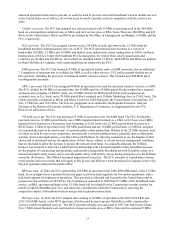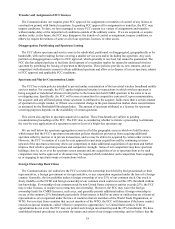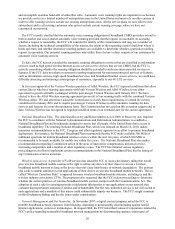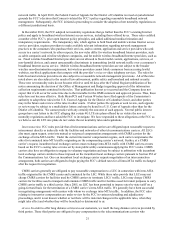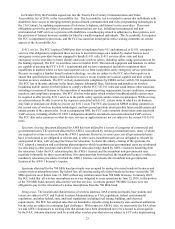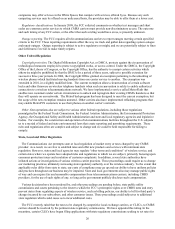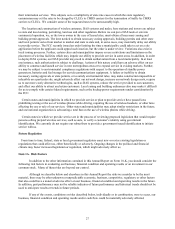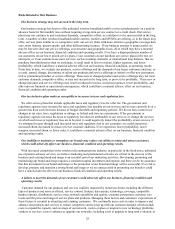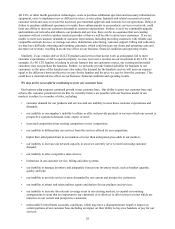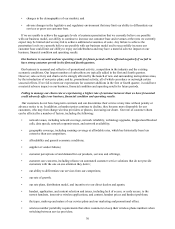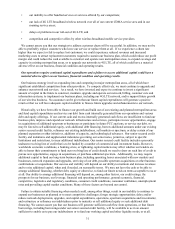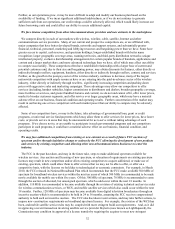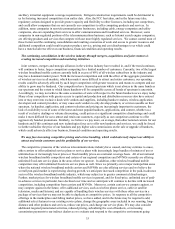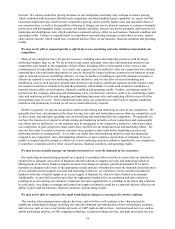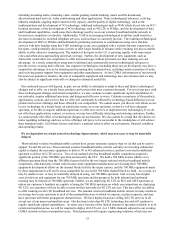Metro PCS 2010 Annual Report Download - page 35
Download and view the complete annual report
Please find page 35 of the 2010 Metro PCS annual report below. You can navigate through the pages in the report by either clicking on the pages listed below, or by using the keyword search tool below to find specific information within the annual report. 25
restrictions on the use of information related to a customer’s location. These rules are broad in scope and require us
not only to protect customer information ourselves, but also to take steps to make sure that our agents and
contractors protect this information. CMRS carriers must take reasonable measures to discover and protect against
pretexting and, in enforcement proceedings, the FCC will infer from evidence of unauthorized disclosures of CPNI
that reasonable protections were not taken. The FCC has imposed substantial fines on certain wireless carriers for
their failure to comply with the FCC’s CPNI rules and this continues to be an area of active regulatory oversight.
The FCC previously conducted a broad scale investigation into whether CMRS carriers are properly protecting the
CPNI of their customers against unauthorized disclosure to third parties and may conduct further investigations in
the future. The FCC also is seeking comment on additional CPNI regulations.
Congress and state legislators also have passed and may pass legislation governing the use and protection of
CPNI and other personal information. For example, Congress enacted the Telephone Records and Privacy Protection
Act of 2006, which imposes criminal penalties upon persons who purchase without a customer’s consent, or use
fraud to gain unauthorized access to, telephone records. In addition, certain states have enacted, and other states in
the future may enact, legislature relating to customer personal information. The recent and pending legislation (if
enacted) may require us to change how we protect our customer’s CPNI and other personal information.
Backup power requirements. In October 2007, the FCC adopted rules which, if they had taken effect, would have
required us to maintain emergency backup power for a minimum of twenty-four hours for certain of our equipment
that is normally powered from local commercial power located inside mobile switching offices, and eight hours for
certain equipment that is normally powered from local commercial power at other locations, including cell sites and
DAS nodes. Various aspects of the rules were challenged in court and before the OMB. As a result, the rules have
never taken effect, but the FCC has indicated that it plans to seek comment on revised backup power rules
applicable to wireless providers. If we are required to meet back up power requirements, or secure additional state
or local permits or authorization, this could delay the construction of any new cell sites or distributed antenna
systems, or DAS systems, and launch of services in new metropolitan areas and increase our costs.
Tower lighting and painting. The FCC has established rules requiring certain towers and other structures to be
painted and lighted to minimize the hazard to air navigation. In addition, we are obligated to notify the FAA if the
required lighting at a tower is no longer being maintained. A failure to abide by these requirements could result in
the imposition of fines and forfeitures or other liability if an accident occurs. We generally collocate on existing
towers and structures owned and operated by others and do not have the right to paint or control the lighting at the
site but, as an FCC-licensed carrier at the site, still could be held accountable if the lighting and painting
requirements are not met.
Radio frequency limits. The FCC sets limits on radio frequency, or RF, emissions from cell sites and has rules
that establish procedures intended to protect persons from RF hazards. We have policies in place designed to comply
with the applicable limits and restrictions at cell sites where we have operations, but, given the number of sites
involved and the nature of the requirements, we cannot guarantee that we are in compliance at each cell site at all
times.
Emergency warning. The FCC has adopted technical standards, protocols, procedures, and other requirements
under the Warning, Alert, and Response Network Act, or WARN Act, to govern emergency alerting standards for
CMRS providers which voluntarily elect to participate. Rules, regulations and industry protocols are in the process
of being developed to implement this program. We plan to participate in the voluntary emergency alert program.
This election may cause us to incur costs and expenses, and customers desiring this service may be required to
purchase new handsets. Under the adopted rules, a participating carrier must notify customers of the availability of
emergency alerts but may not charge separately for the alerting capability and the CMRS carrier’s liability related
to, or any harm resulting from, the transmission of, or failure to transmit, an emergency alert is limited. If we decide
to withdraw from participation at a later date, our customers may decide to terminate their service with us. The FCC
also is considering the feasibility of requiring wireless providers to distribute emergency information and, if it does
so, the requirements to which we are subject under the rules and the WARN Act may change, which could cause us
to incur additional costs and expenses.
White spaces. The FCC has adopted rules to allow unlicensed radio transmitters to operate in the unused
broadcast digital television spectrum, or White Spaces. The FCC’s rules provide for both fixed and personal/portable
devices to operate in the White Spaces on an unlicensed basis, subject to various protections to existing users of the
spectrum. Policies and industry protocols are in the process of being developed to implement this program. Other


